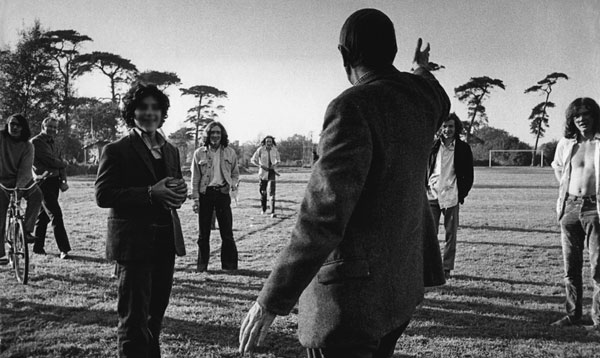 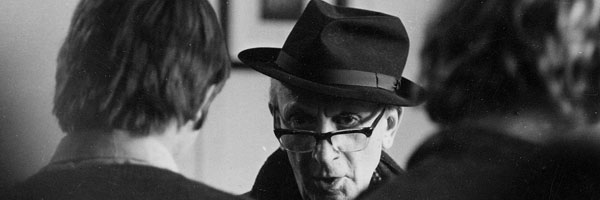 Recollections
of George Lyward and Finchden
Manor
Recollections
of George Lyward and Finchden
ManorThe Times 6 September 2003 by Tom Robinson photo: Peter Mould |
|
| One
night in the winter of 1966
I swallowed a handful of
pills in a boarding school
dorm to try and end my life,
having fallen hopelessly
and unrequitedly in love
with another boy. Back then
homosexuality was still
punishable by four years
in prison and at 16, awash
with hormones and selfloathing,
I'd rather have died than
admit to anyone who and
what I truly was. My subsequent spell in a clinic with tests, sedatives, antidepressants and psychoanalysis did little to improve my frame of mind. Today my despairing father was driving me through the Weald of Kent towards my last hope - an interview at Finchden Manor. At the very edge of Tenterden a curving gravel drive hedged in with overgrown yew gave suddenly onto the courtyard of a battered Jacobean manorhouse. Even as we parked, several unshaven faces stared out through dirty leaded windows that had been been broken and mended again and again. They were framed with hair like - not Beatles or even Rolling Stones - but like, well, girls. It was January 1967. 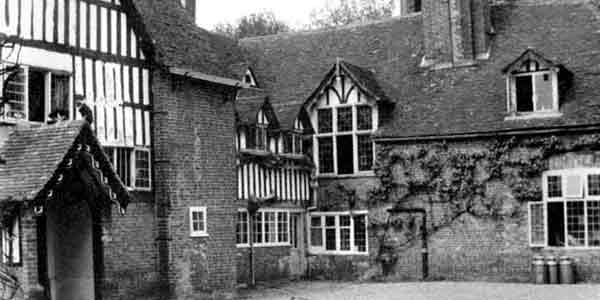
|
|
|
A reassuringly normal-looking boy answered the front door. After an agonising wait he showed us into an oak panelled study and the presence of a slight, stooping septegenarian in a tweed jacket with misty plastic-rimmed spectacles. As George Lyward stepped forward to take my hand in both of his, and hold it for longer than felt comfortable, I became aware of a formidable charisma. "Hello" he said, looking at me piercingly for a moment over his glasses before adding softly "You're very lonely aren't you ?" I practically burst into tears on the spot. After all the drugs and psychiatric nonsense, here at last was someone who understood, saw at once where I was hurting and knew how to make the hurting stop. I instinctively trusted him with my life.
"After Tom had spent two hours with Lyward the boy was transformed" my dad noted in his diary at the time. Next came the scary bit - getting shown around by one of the boys and joining them for lunch. The house was rambling and dilapidated, the grounds extensive and mysterious. There was a rosegarden, a pond, a pigeon shed, cricket nets and croquet hoops, a cavernous hall, several grand pianos, two shacks stuffed with electronic junk and art materials, a well-used darkroom and even a pottery complete with woodfired kiln. Plus a full sized log cabin built for a bet. And everywhere these unkempt youths in tattered clothes like some bizarre alien tribe. |
|
 In all there were some 50 young men ranging from mid-teens to early twenties, ten staff, half a dozen dogs and countless cats. All lived at close quarters in damp unheated rooms spread around the old house and outbuildings. Though drink was forbidden, smoking was tolerated and the pervading musky odour of the place was indescribable - though within a few days one ceased to notice it at all. More fastidious standards prevailed in Mr & Mrs Lyward's comfortable living quarters and well tended garden. But the boys' side of the house had been trashed by so many successive generations that that replacing soft furnishings, curtains and carpets had long been rendered pointless. That lunchtime we sat jammed rowdily together on wooden benches at trestle tables. Hygene was basic yet the food was edible, the shouting banter good natured, and the atmosphere vigorously alive. It couldn't have been more different from the Quaker boarding school I'd just left. At the end of my visit, Mr Lyward told me Finchden was currently full with a long waiting list, and in any case didn't normally take boys as "sick" as me. Then he asked quite suddenly: "Do you want to come ?" I seized the lifeline, and stayed six years. 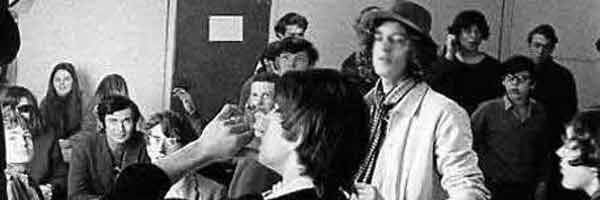 Commentators from Robert Bly to Angela Phillips have suggested that not only do boys grow up at a different rate from girls but that many today are failing to grow up at all. The absent parents, disruptive pupils, underachieving students, binge drinkers, drug addicts, petty criminals, sexual predators, teen suicides and swathes of alienated youth they depict are indeed overwhelmingly male. But arrested emotional development in young men is scarcely a new phenomenon. George Lyward had perceived the beginnings of this crisis at least 80 years ago. As a public school housemaster in the 1920s he became adept at helping antisocial and delinquent boys who might otherwise have been left, as he put it, "to the further mercy of their inward conflicts and compulsions". His success in releasing and emotionally re-educating problem adolescents led several eminent psychologists to request his assistance with boy patients of their own. As the demand for his help increased, Mr Lyward and his wife started a small community of their own in a Kentish farmhouse. By 1935 they had moved to the larger premises of Finchden Manor near Tenterden which continued to offer "a form of hospitality" to those who needed it for a further 38 years. 
|
|
| Most
of us who came to Finchden
had been excluded from school
for one reason or another.
For some it was an alternative
to borstal, mental hospital
or - as in my own case -
simple extinction. None
of us were much interested
in each other's past lives
- all that counted was the
kind of person you were
in the here and now. New arrivals deemed 'sullen' 'violent', 'compulsive', 'dishonest' or even 'psychotic' in the outside world were therefore free to shed their labels and regress to a boyhood world of comics, cards, football, fishing, hobbies and horseplay. "Why not let them have back their childhood?" Mr Lyward once asked "Let them do all those things. If they don't do them now, they'll do much worse things later." The daily schedule consisted only of four shared meals and a bedtime of 10.15pm. There were no locks on the doors, no formal routine and no curriculum. A weekly chores rota allocated cooking, washing up, clearing, cleaning and garbage disposal - but without sanctions. Things got done because they needed doing: if you ignored the washing up, nobody got to eat. Much of the therapy came simply from this spontaneous friction of community life. The challenge we all (unconsciously) faced was a slow journey from the blind, unboundaried world of infancy towards a greater awareness and acceptance of others. A recognition that indeed no man is an island. In short, growing up. |
 |
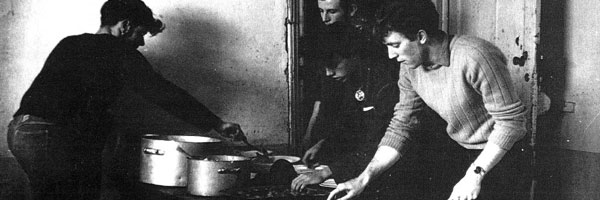 |
|
 |
The
apparently "free-for-all"
atmosphere was constantly,
though unobtrusively, monitored
by the staff and subject
to unpredictable interventions
by Mr Lyward. These could
be playful, stern, or (more
usually) a deliberate mixture
of the two - designed to
loosen, surprise, delight,
challenge, and occasionally
to bring up short. There might be breakfast outdoors, strawberries for tea, or a trip to the seaside. A general room change might suddenly be posted, throwing the social kaleidescope into complete upheaval. There might be double pocket money one week, or none when one of the dogs killed a neighbouring farmer's sheep. A formal dance, or a Shakespeare play could precipitate months of meticulous rehearsal and preparation. Or else he might call for a "command performance" - an impromptu cabaret to be delivered in front of the whole house that same evening. Occasionally he would impose a gating, with all boys required to remain on site for a while. Naturally, some of us would assert our independence by breaking gatings, ignoring bedtimes, neglecting chores, getting drunk, running away or opting out of community life in any number of ways. Everyone did it, though seldom for long. Cycling on the nearby country roads, you could stray across the white line from time to time with impunity. But anyone who tried to ride on the wrong side of the road for their entire journey would soon be brought to an abrupt halt. Mr Lyward's cold deliberate anger, deployed as a therapeutic tool, was a terrifying elemental force. I never saw anyone - adult or adolescent - withstand it. Time at Finchden felt infinite, with complete respite from all forms of nagging and pressure. "When will I be taking my 'A' levels..." I stammered, shortly after arriving. "To hell with your 'A' levels" snapped Mr Lyward - and the relief was overwhelming. Four years later when I wistfully mentioned French had been a favourite subject, he arranged one-to-one coaching with a retired schoolteacher. I took and passed 'A' level in four months and English followed a year later. In between, I learned simply to live. Finchden introduced me to the music of Leadbelly, Coltrane, Zappa and Bach's Italian concerto. I wrote cod news bulletins for our homemade 'radio' station - a ramshackle network of wires and speakers strung around the house. I learned photography, saving up pocket money for developer and printing paper. And, like everyone else, I learned to cook: the daily cuisine varied wildly according to whose turn it was in the kitchen. One distinguished old boy was the broadcaster and bluesman Alexis Korner - who turned up one day and gave an acoustic concert in Mr Lyward's study. A swarthy 40 year old with a shock of grizzled hair and a voice like gravel, Alexis strapped on a guitar and belted out songs about women, drink, policemen and civil rights without a trace of embarrassment. I knew in that instant what I wanted to do with the rest of my life. |
  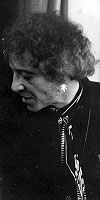
|
|
Finally,
to my astonishment, a
chunky olive skinned new
boy arrived one Spring
and promptly fell in love
with me. We had a wild
affair for several months,
bunking off at night with
blankets to sleep in a
nearby field. Others knew,
few minded. "You
do realise you have other
possibilities?" Mr
Lyward asked curtly at
one point, but otherwise
chose not to intervene.
Also
see additional pages |
||
MEMORIAL | BOOK | ESSAYS | AUTOBIOG | NOTES | FURTHER | FACEBOOK | ARTICLE | PHOTOS | OLD BOYS


